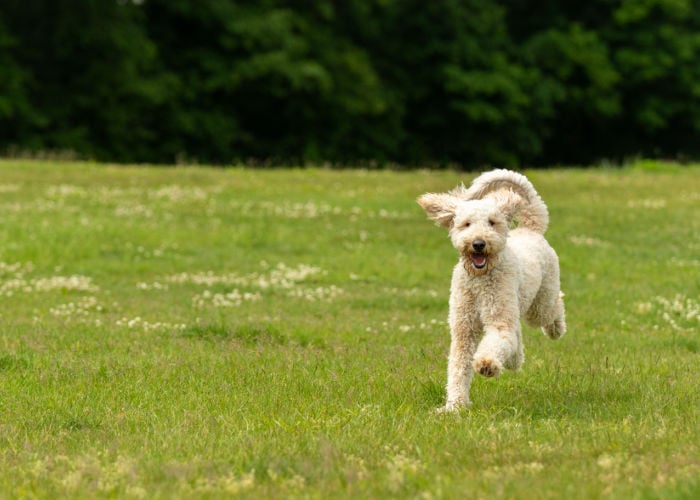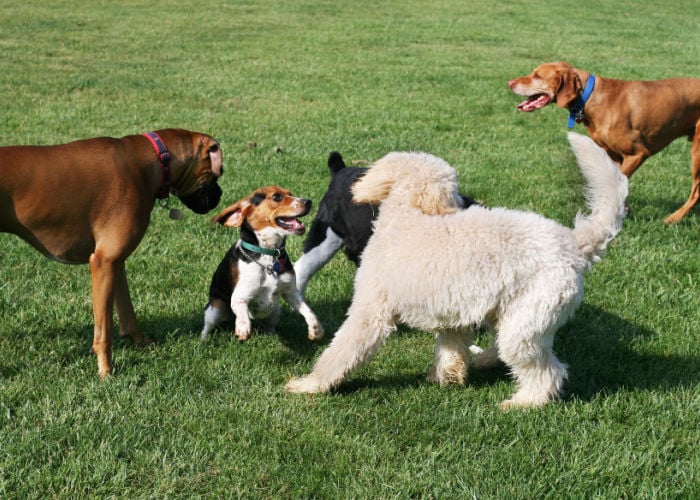
Table of Contents
- Benefits of Dog Parks
- Dog Parks Improve Dog’s Physical Health
- Dog Parks Encourage Active Lifestyle
- Dog-to-Dog Socialization in Dog Parks
- Dog-to-Person Socialization in Dog Parks
- People Interaction Inside Dog Parks
- Dog Parks are Space for Off-Leash Activities
- Location for Dog Playdates
- Dog Parks Create a Happier Community
- Dog Parks Promote Dog Care Awareness
- Dog Parks Promote Dog Adoption
- Lesser Dog Road Accidents
- Cons of Dog Parks
- Benefits of Dog Parks: Final Thoughts
Off-leash parks are ever-increasing in the country as owners and trainers alike are promoting the benefits of dog parks.
With its benefits at full display, dog parks are suddenly becoming a favorite place for many dog owners in their community.
On the other hand, dog experts challenge the benefits of dog parks.
So in this blog, we’ll talk about the pros and cons of dog parks. As much as we should emphasize the dog park benefits, there are some disadvantages too that we should also consider.
Should we really advocate for dog parks, or can the harm outweigh the benefits?
Read more to find out.

Benefits of Dog Parks
Are dog parks good for dogs and their owners? Yes, they are.
In fact, you can almost see and feel these various dog park benefits around you. Some of these benefits manifest in physically fit dogs, owners, and large dog crowds.
There are also benefits of dog parks that radiate throughout the community.
It could be that your community is slowly becoming interested more in dogs, or there’s an overall increase in happiness in the area.
To elaborate on these ideas, below are some of the benefits of dog parks to owners, dogs, and the community.
Dog Parks Improve Dog’s Physical Health
One of the benefits of dog parks is they help improve your dog's physical health.
Dog parks offer your dog a space for physical activities and exercise. It also has the right facilities and sets of equipment to make physical fitness accessible to your dog.
Do note, however, that a session in dog parks should not completely replace the time for dog walks.
All these activities within the park should only supplement the dog walks that are necessary for your pooch.
RELATED: 5 TIPS TO GET YOUR DOG IN BETTER PHYSICAL SHAPE

Dog Parks Encourage Active Lifestyle
Dog parks don’t only promote an active lifestyle for dogs but for owners as well.
You become more active when you take your dog to the dog park and back rather than simply letting your dog play in the backyard.
And when you’re in the dog park, you also become more engaged as you play, run, and exercise with your dog.
That’s why dog parks are more than just places or locations. They're now an active routine in your lifestyle as well.

Dog-to-Dog Socialization in Dog Parks
Socialization with its canine fellows is an important aspect of a growing dog. Getting accustomed to other dogs helps boost their mental health and self-esteem.
With enough confidence, your dog will be more willing to participate and cooperate with other dogs.
That’s why one of the benefits of dog parks is it makes dog-to-dog socialization possible and easier.
Dog parks serve as a safe space to expose your dog to its kind.
With a facility that has amenities catered to dog activities, your pet dog has every chance to bond with others.
RELATED: 8 SCIENTIFIC REASONS TO SOCIALIZE YOUR DOGS
Dog-to-Person Socialization in Dog Parks
Another benefit of dog parks is it also encourages dogs to socialize with people.
Dog parks become areas of dog-to-human interaction without making the dog uncomfortable and forced.
Your dog will get used to seeing new faces with a lot of people coming in and out of dog parks. It will also encounter regulars of dog parks, which helps establish familiarity.
Eventually, your dog will feel comfortable and secure whenever they interact with people other than their owners.

People Interaction Inside Dog Parks
A dog park is not only a place for dog socialization but for people as well!
Interacting with fellow dog owners becomes inevitable in an area that has both of your interests in it.
After all, everyone in the dog park shares the same passion for taking good care of the dogs.
With kind gestures towards other owners, you can easily strike up a conversation and do activities together.
From there, forming bonds and doing activities together with fellow owners becomes second nature.
Dog Parks are Space for Off-Leash Activities
What’s one thing a dog park can do better than your backyard? It gives a large space for your dog to run around!
Dog parks are the best place to do off-leash activities with your dog.
Most dog parks have an area size of one acre; some dog parks have a size that’s larger than that!
An acre is more than enough to tire out even the most high-spirited dogs.
Even better than that, with that size, you can install dog equipment like obstacle courses, playgrounds, and sandboxes in the area.
Not only do dog parks encourage off-leash recreational activities, but they make it accessible too!

Location for Dog Playdates
Do you know why doggy playdates aren’t usually recommended in one of the owner’s houses?
It’s because your house is not a neutral area for the dogs.
Dogs will assume that your house is theirs as well, treating it as their territory that they need to protect.
They become protective and will exhibit territorial behavior, which ruins any chance of a possible playdate.
The same also goes if the venue is at another dog owner’s house instead.
That’s why picking the right place is important when it comes to organizing playdates.
For that reason, dog parks are the best place for doggy playdates. Since none of the dogs owns the place, how will they assume territory on it?
And with a lot of dogs occupying the area as well, your pet dog and its date will have difficulty marking territories in the area.
RELATED: DOGS MARKING THEIR TERRITORY AND HOW TO STOP THEM
Dog Parks Create a Happier Community
Did you know that dogs can make people happy?
Just the sight of dogs helps our bodies release certain hormones like dopamine, oxytocin, and serotonin.
These chemicals are pleasure and love hormones that significantly brighten our mood.
For that reason, dog parks can brighten up their vicinity.
A regularly maintained dog park is cleaner and greener, which brings a positive outlook to the community.
With dog parks, you now have more chances to bond with your neighbors. These shared activities and experiences with them are an easy way to foster a tight-knit community.
That’s why passersby can easily associate the multiple sightings of dogs in the vicinity with a cheerful and happier community.

Dog Parks Promote Dog Care Awareness
The good thing about dog parks is that they’re filled with people who have a passion for caring for dogs.
Regulars of dog parks are mostly seasoned dog owners who can give tips about how to take care of your dogs.
They can also share their personal experiences and insights to address your problems with your dog.
Their experiences alone can help raise and spread awareness concerning proper dog care.
From dog breeds, nutrition, grooming, training, and recommended dog items, they got you covered.
These veteran dog owners are more than willing to help a fellow owner in need.
RELATED: 8 VET'S TIPS ON HOW TO CARE FOR SENIOR DOGS
Dog Parks Promote Dog Adoption
Dog parks can help promote dog adoption in the vicinity, further increasing the number of dog owners in the area.
Here’s how dog parks can make dog ownership contagious.
If people know how much happiness dogs can bring to our lives, they are more likely to own and adopt as well. And that is what dog parks are trying to portray.
Dog parks are filled with sights of happy dogs and owners. To onlookers, the happy sights can help spark interest in owning dogs.
They’ll be more motivated to research dog ownership and how to take care of them.
Soon, they’ll eventually want to adopt and own a dog and create their own happy moments together.
Lesser Dog Road Accidents
Another benefit of dog parks is that they can help lessen dog traffic and road accidents.
Dog parks are enclosed spaces and controlled environments that help contains off-leash dogs. Wandering outside this secured area is less likely.
A dog contained in a space is a lesser dog in the streets. That also means there will be lesser dogs that will be victims of road-related accidents.

Cons of Dog Parks
Are dog parks bad for dogs and owners? Unfortunately, dog parks can be harmful to dogs and even their owners.
Amongst the various pros and cons of dog parks, the place can be a nest for disease-causing pathogens.
Dog parks also make encounters with aggressive dogs inevitable, which spells trouble for small pooches.
And then, there are the environmental impacts of dog parks.
All of these dog park cons, however, are the result of a poorly managed dog park.
With the right mindset, funds, and approach, a community can easily manage and mitigate the aforementioned risks.
Potential Spread of Disease
Dog parks are the perfect place to spread diseases to other dogs.
A lot of dog parks in the United States are publicly-owned and have minimal rules and regulations.
The lack of sound health regulations in the park means more unvaccinated dogs may visit the place.
These sick dogs become the carriers and risk spreading the diseases to healthy, vaccinated dogs.
Even worse than that, a dog park itself can also become a breeding place for health diseases to dogs.
Danger from Aggressive or Big Dogs
Dog parks are filled to the brim with all sorts of dogs.
So it’s no wonder you and your dog will also face aggressive dog encounters in the vicinity.
Aggressive dogs are dangerous creatures in the park that would most likely start a fight inside the park.
They’re also the culprits for many dog-bullying incidents, injuries, and even preying in parks.
Normally, dog parks would have rules about dog size segregation. But there are dog parks throughout the country that don’t have this regulation.
That’s why dog bullying is slowly becoming a problem in large dog parks across the country.
What’s worse is that their havoc doesn’t end with just dog incidents. In fact, aggressive dogs can inflict damage on dog owners through their bites alone.
When that happens, the state laws overrule the park policies, and court sessions ensue. Dog incidents like this end up in lawsuits and damage compensations.
Maintenance and Pollution
Dog park pros and cons are mostly dependent on the proper management of the facilities.
And for poorly managed dog parks, pollution will most likely be a recurring issue.
In a recently conducted study, off-leash dog parks are the most contaminated places of dog fecal matter.
Dog parks have approximately 127.23 grams of dog poop per hectare, which is a lot compared to other types of urban parks.
Dog parks also face the issue of improper waste disposal both by the park user and the management.
Without a hard dog park policy to double down on rules, the implementation of waste stations and park inspection becomes inconsistent.
And with some states underfunding a lot of dog parks, maintenance and repairs are postponed too.
Dog parks will suffer from slow degradation until it becomes an eyesore and unusable space in the community.
Inappropriate and Rude Behaviors
Another disadvantage of a dog park is that it’s a place where your dog can pick up rude and improper behaviors.
Dog owners would need to give up some aspects of control over their dogs in off-leash parks.
If the dog finds out that their owners have little control over them in the park, they will ignore their masters.
They also become immersed in the park experience rather than responding to their owner’s cues.
Dogs can also pick up behaviors from other dogs in the park like a teen succumbing to peer pressure.
Normally, an experienced trainer can easily manage all of the dog’s newfound behaviors in the park.
But to a newbie dog owner, their dog becomes uncontrollable and even easily agitated.
Benefits of Dog Parks: Final Thoughts
Indeed, both the pros and cons of dog parks are worth considering.
Supporters will focus on the benefits of dog parks, while protesters lean toward the drawbacks.
Hate it or love it, these types of parks will likely stay because of their perceived dog park benefits.
The benefits also outweigh the harm, which will only surface in dog parks with poor management.
Dog parks with the right management, policies, and funds will continue bridging dogs and owners alike.
But what do you think?
Are dog parks good for dogs, or are dog parks bad for dogs?













